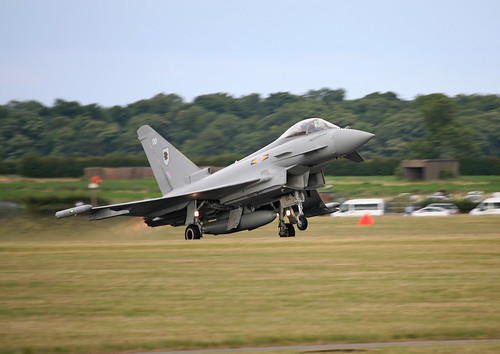 Defence cannot be exempt from the coalition government’s emergency budget, and the ‘pain’ that David Cameron has promised. Professor Christopher Brown of LSE’s International Relations department takes a look at what might be cut – and finds that the ‘big-ticket’ items such as the Eurofighter and Trident might not be easy to cancel.
Defence cannot be exempt from the coalition government’s emergency budget, and the ‘pain’ that David Cameron has promised. Professor Christopher Brown of LSE’s International Relations department takes a look at what might be cut – and finds that the ‘big-ticket’ items such as the Eurofighter and Trident might not be easy to cancel.
The government’s commitment to protect front line services has particular resonance when it comes to defence spending, for obvious reasons. The defence budget has actually been expanding at around 1.5 per cent per annum in real terms for the last few years, and it looks ripe for the kind of hard decisions that the coalition is priding itself on taking. But the problem is that it is actually only in front line services that spending cuts can be made in the short to medium term.
The really big budget contract items – the two new aircraft carriers, the next tranche of the Eurofighter contract, and Trident – either involve spending way down the line, or are already contracted for in ways that make them difficult to cancel. Many defence analysts regard the two carriers, already named as HMS Prince of Wales and Queen Elizabeth, as gigantic white elephants. But the penalty clauses that would come into play if contracts for the ships were revoked would be as expensive as building them would be – although, at least if cancelled, they wouldn’t have to be crewed in the future.
In my view it makes sense to put Trident on hold for a few years, but little would be saved by so doing. And cancelling the next batch of Eurofighters would create a major diplomatic incident with our partners in the project. The basic point is that to save money in the short term you have to cut staff costs, which in this case means soldiers. Yet it is already clear that the army is stretched to breaking point by the Afghan campaign, and the other two services have no spare capacity.
So, if the government announces defence spending cuts in the budget, then either they will be wholly cosmetic, or this will signal a genuine reappraisal/downsizing of Britain’s role in Afghanistan – and, interestingly, there is some evidence that this is actually where we are going. Liam Fox’s remarks about not being able to fix a broken 13th century society is one sign of disillusionment with current strategy. And the continual critiques by British politicians of NATO partners for leaving Britain to carry the largest load is another sign – although this view is not actually valid, as the Danes and Canadians can both testify. But the political costs of a withdrawal would be very high, both at home and abroad. These are fascinating dilemmas then – watch this space!





